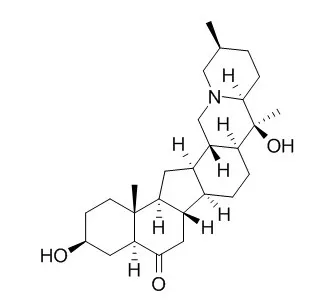The aim of this study was to investigate whether or not Peiminine inhibits lung inflammation and pulmonary fibrosis in a rat model of bleomycin-induced lung injury.
METHODS AND RESULTS:
Rats were randomly divided into 4 groups. In 3 groups, intratracheal bleomycin (5 mg/kg) was used to induce acute lung injury, followed by administration of either carboxymethyl cellulose (control group, n=14), dexamethasone (DXS group, n=14) or Peiminine (Peiminine group, n=10). In the fourth group (sham-operated, n=12), normal saline was instilled instead of bleomycin, followed by administration of carboxymethyl cellulose. Drugs were administered intragastrically for 28 days. Lung sections were stained with hematoxylin and eosin (H&E) and Masson's trichrome, to grade the degree of alveolitis and pulmonary fibrosis. The lung index was calculated as the ratio of lung to body weight. Serum levels of interleukin-4 (IL-4), tumor necrosis factor-α (TNF-α) and interferon-γ (IFN-γ) were obtained using a radioimmunoassay. Immunocytochemical methods were employed to assess the expression of transforming growth factor-β (TGF-β), connective tissue growth factor (CTGF), NF-κB, extracellular signal-related kinase (ERK1/2), Fas and FasL in lung tissue. Peiminine and DXS significantly reduced alveolar inflammation and pulmonary interstitial inflammation in rats with bleomycin-induced lung injury. These protective effects were associated with significant (P<0.05) decreases in the levels of IFN-γ in serum and of TGF-β, CTGF, ERK1/2, NF-κB and FasL in lung tissue. No effects were observed on serum TNF-α or IL-4.
CONCLUSIONS:
In conclusion, Peiminine inhibits lung inflammation and pulmonary fibrosis in a rat model of bleomycin-induced lung injury, by reducing circulating IFN-γ levels and inhibiting signal transduction pathways involving TGF-β, CTGF, ERK1/2, NF-κB and FasL. |






 Cell. 2018 Jan 11;172(1-2):249-261.e12. doi: 10.1016/j.cell.2017.12.019.IF=36.216(2019)
Cell. 2018 Jan 11;172(1-2):249-261.e12. doi: 10.1016/j.cell.2017.12.019.IF=36.216(2019) Cell Metab. 2020 Mar 3;31(3):534-548.e5. doi: 10.1016/j.cmet.2020.01.002.IF=22.415(2019)
Cell Metab. 2020 Mar 3;31(3):534-548.e5. doi: 10.1016/j.cmet.2020.01.002.IF=22.415(2019) Mol Cell. 2017 Nov 16;68(4):673-685.e6. doi: 10.1016/j.molcel.2017.10.022.IF=14.548(2019)
Mol Cell. 2017 Nov 16;68(4):673-685.e6. doi: 10.1016/j.molcel.2017.10.022.IF=14.548(2019)